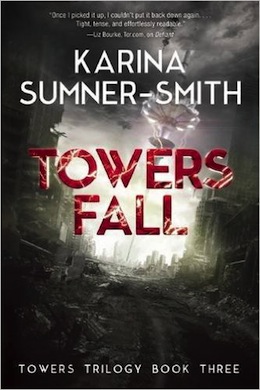Towers Fall is the third and final volume in Karina Sumner-Smith’s debut trilogy from Talos Books. I’m tempted to call it a tour-de-force, but that’s mainly for the strength of my emotional reaction to this, the climax and conclusion of a very strong arc. Sumner-Smith’s career, I think, will be well worth watching.
Towers Fall is impossible to discuss without reference to its predecessors, Radiant and Defiant, so be warned for spoilers ahead.
In Radiant, Xhea—angry, lonely, isolated by the talent that lets her see ghosts but that causes the living pain at her touch—becomes attached to Shai, the ghost of a young woman who is a Radiant, one of the rare sort of people who generates enormous amounts of magic simply by existing. Over the course of the book, they become friends, even as the Towers—where the middle-class and elite of Xhea’s world live, quite literally floating above everyone else—seek to bind Shai and her magic to their own ends. In the course of Defiant, Xhea learns more about her own power, her own dark magic that will one day kill her, and its relationship to the bright magic that almost everyone else simply thinks of as magic. Her friendship with Shai deepens and grows. And Xhea begins to learn how and when to trust, how to make connections and accept help.
At the close of Defiant, after upheavals in the powers in the Lower City—the city that lies below the Towers, crumbling skyscrapers and ruins and tunnels, where live the people who do not possess the kinds of magic the Towers require their residents to have—Xhea and Shai learn that the Lower City is a being of magic. That it’s alive, as the Towers are alive, but where their hearts are formed of bright magic, the Lower City’s heart is dark magic: the accumulated dark magic the Towers have poured down from the sky over generations, as the by-product of their bright energies.
This is where Towers Fall opens. The powers of the Lower City are no longer fighting each other, but the Towers have taken note. The Central Spire, the Towers’ central authority, sends down an ultimatum to the people below: evacuate, because in three days, the Lower City will be destroyed by the Spire.
If I were to describe the plot of Towers Fall, it would seem perhaps odd that I have come to hold it—hold this whole trilogy—in quite high regard. It’s a series of desperate moves and discoveries, and both Xhea and Shai spend the novel feeling, if not actually being, helpless to change the fate about to descend on the Lower City. But what makes it work, what makes the whole trilogy work, is its emotional core. That core is the friendship between Xhea and Shai, what each of them learn from, and gain from, each other—and what each of them are willing to sacrifice for each other. Xhea started out as someone unwilling to sacrifice anything for anybody. But now she’ll protect Shai with everything she has—but Shai is willing to walk with her eyes wide open towards her own destruction to help Xhea save the Lower City.
In spite of everything—or maybe because of it—Xhea laughed.
“We’ve caused such trouble, you and I.” Her voice was almost lost in the sound of the ground breaking, cracking, falling in upon the tunnels far below. “You ever think that maybe things would be easier if we just gave up and died?”
“Tried it,” Shai said. “Didn’t solve anything.”
The pacing in Towers Fall isn’t as tight or as tense as in Defiant. Towers Fall is a more reflective novel, more interior, despite the three-day timeline and the looming spectre of destruction. But it’s still plenty tense.
The best thing about this trilogy is the voice. Sumner-Smith brings us two amazing characters, with individual and compelling voices, and balances them against each other. Xhea and Shai start out very different, but over the course of the trilogy they come to mirror and complement each other in surprising ways. In Towers Fall, their commitment to each other is challenged—and reaffirmed. Female friendship, front and centre!
It’s a poignant book, in many ways. A book about the cost of caring, the cost of living—and dying—among people you can’t always save, in a world you can’t always fix, and where trying hurts. But it is hopeful, too, and while the ending doesn’t resolve everything, it is a satisfying conclusion to the emotional arc.
I’m really looking forward to seeing what Sumner-Smith does next.
Towers Fall is available November 17th from Talos.
Liz Bourke is a cranky person who reads books. Her blog. Her Twitter.










